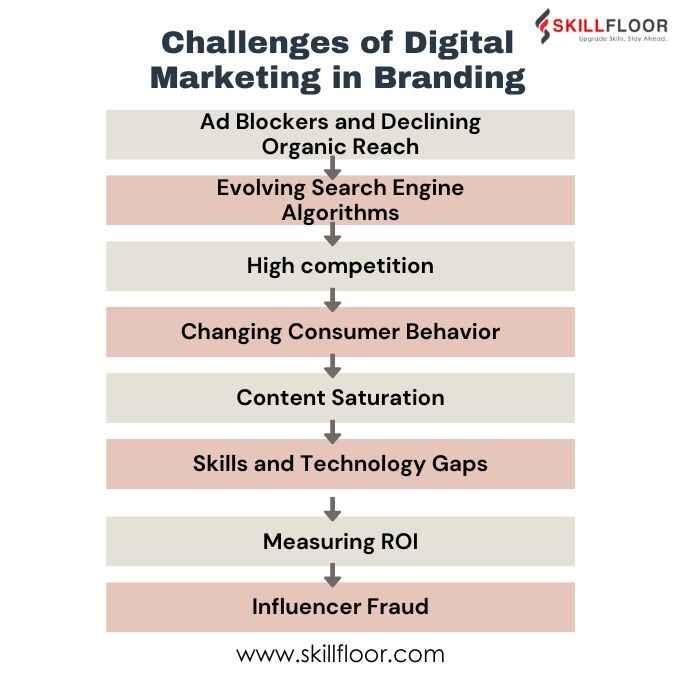Role Of Digital Marketing In Branding
Explore how digital marketing plays a vital role in building and promoting brands online, increasing their visibility and engagement in the digital space.

In today's fast-paced digital surroundings, the role of digital marketing in branding cannot be underestimated. As brands compete for attention in an increasingly congested market, utilizing internet channels becomes critical. Digital marketing not only increases visibility but also allows businesses to interact directly with their target audience, cultivating a sense of community and loyalty. This strategic approach to internet branding employs a variety of tools and tactics to establish a distinctive brand identity.
The integration of digital marketing in branding goes beyond advertising to include content development, social media involvement, SEO, and data analytics. These pieces work together to create a cohesive and effective brand statement. Effective digital marketing strategies keep firms relevant and competitive in their sectors by adjusting to changing consumer habits and technology improvements.
Furthermore, digital marketing for branding provides quantitative results and scalability, which traditional marketing channels frequently lack. Brands may track progress and refine tactics in real-time, enabling more dynamic and responsive marketing approaches. This versatility is critical for sustaining a strong brand presence in the digital space, where trends and customer preferences change quickly.
The Importance of Digital Marketing in Branding
1. Establishing the Brand Identity
Building a strong online brand identity is the first step in digital marketing. This includes developing a professional website, social media profiles, and compelling content that embodies the brand's values. Businesses may develop a recognizable brand by using consistent colors, logos, and messaging in a congested digital territory.
2. Enhancing Visibility Through SEO and SEM.
Search Engine Optimization (SEO) and Search Engine Marketing (SEM)\ are critical to improving visibility. Businesses can improve their search engine rankings by improving their website content with relevant keywords. SEM tactics such as pay-per-click advertising can potentially generate large traffic to a website, improving brand exposure and recognition.
3. Engaging with Customers on Social Media
Social media networks are excellent instruments for dynamic participation. They enable brands to engage directly with their target audience, obtain feedback, and develop partnerships. Brands may keep their audience interested in their story by providing regular updates, promotional efforts, and user-generated material.
4. Content Marketing: Storytelling for Your Brand
Content marketing is a strategic marketing method that involves developing and delivering valuable, relevant, and consistent information to attract and maintain a certain audience. Brands may use blogs, films, podcasts, and infographics to tell their narrative, educate customers, and position themselves as industry thought leaders.
5. Data-Driven Insights: Personalized Marketing
Digital marketing gives you access to massive volumes of data that you can examine to learn more about your customers' interests and behavior. This information allows firms to adjust their marketing efforts to the requirements and interests of their target audience, resulting in more personalized and effective digital campaigns.
6. Building Customer Loyalty with Email Marketing
Email marketing is still one of the most effective digital marketing tactics for increasing loyalty and retaining consumer relationships. Brands may retain customers and drive repeat business by delivering tailored emails, newsletters, and exclusive deals.
7. Reputation Management and Customer Reviews
Online reputation management is essential for preserving a positive brand image. Digital marketing solutions allow firms to track mentions and respond to customer feedback and concerns in real-time. This not only helps to resolve difficulties but also reflects the brand's dedication to client happiness.
Challenges of Digital Marketing in Branding
-
Ad Blockers and Declining Organic Reach: Because of the proliferation of ad blockers, a large proportion of internet users never see advertisements. Additionally, platforms such as Facebook and Instagram have decreased the organic reach of postings, making it more difficult for firms to communicate with their audience without paying for advertising.
-
Evolving Search Engine Algorithms: Search engines frequently alter their algorithms to improve user experience. Brands must keep up with these developments to optimize their SEO tactics and ensure that their content ranks highly in search results.
-
High competition: The digital space is becoming overcrowded. Standing out from multiple competitors that are only a click away is a constant challenge for brands, necessitating inventive strategies and consistent engagement approaches.
-
Changing Consumer Behavior: Consumer preferences and habits are continually changing, affected by new technologies and trends. Brands must constantly change their digital marketing strategy to match these evolving needs and expectations.
-
Content Saturation: With so much content available online, it can be tough for brands to attract attention. Creating distinctive, high-quality content that speaks to the target audience is critical for effective branding.
-
Skills and Technology Gaps: Digital marketing necessitates a diverse set of abilities as well as familiarity with multiple platforms and tools. Keeping up with technology changes and properly educating personnel can be time-consuming.
-
Measuring ROI: Estimating the return on investment (ROI) for digital marketing activities can be difficult. Accurate measurement and analytics are critical for justifying the budget and refining strategy.
-
Influencer Fraud: As influencer marketing expands, so does the risk of engaging with influencers who engage in fraudulent behavior or do not share the brand's values, thereby harming the brand's reputation.

How does digital marketing contribute to brand building?
Digital marketing is a cornerstone of brand building, providing a varied set of tools and channels for efficiently engaging with target consumers. Brands may increase visibility and awareness by properly positioning themselves on platforms such as social media, search engines, and email marketing. Brands can ensure their message reaches the appropriate audience at the right time by utilizing customized advertising campaigns and search engine optimization tactics, enhancing effect and driving brand recognition.
Furthermore, digital marketing allows businesses to build personalized and engaging experiences that connect with customers on a deeper level. Brands may establish long-term relationships and trust with their audience by encouraging involvement via social media interactions, email newsletters, and intriguing website content. The amount of data and insights supplied by digital marketing analytics enables organizations to fine-tune their plans, optimize their campaigns, and customize their messaging to fit the changing demands and preferences of their target population. In essence, digital marketing acts as a catalyst for brand growth, allowing firms to connect with consumers in meaningful ways, increase engagement, and eventually position themselves as industry leaders.
digital marketing plays a critical role in establishing brand identities by providing tools for visibility, engagement, and personalized experiences. Brands can increase their audience reach and resonance by implementing methods such as SEO, social media, and content marketing. This dynamic approach allows firms to remain competitive, adapt to consumer tastes, and create long-term connections. Finally, digital marketing not only increases brand awareness but also develops loyalty and places businesses as industry leaders.






























































